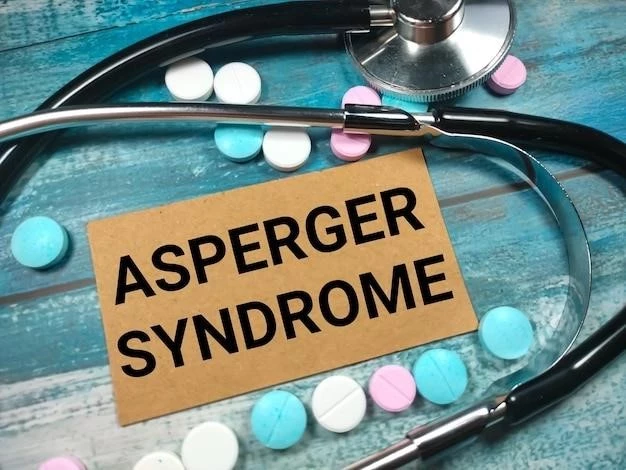Understanding Lyngstadaas Syndrome
Lyngstadaas syndrome is a rare genetic disorder with unique characteristics․ This article provides in-depth insights into the disease, offering valuable information on its genetic basis, symptoms, diagnosis, impact on individuals, treatment options, research, and more․
Introduction
Welcome to a comprehensive guide on Lyngstadaas syndrome, a rare genetic disorder that affects individuals globally․ This article aims to deepen your understanding of this condition by exploring its genetic basis, symptoms, diagnosis, impact, treatment options, ongoing research, and more․
By delving into the intricate details of Lyngstadaas syndrome, you will gain valuable insights into its complexities and implications for affected individuals․ Stay tuned to uncover the latest developments in the field, management strategies, and lifestyle recommendations to enhance the overall well-being of those living with this condition․
Genetic Basis
Understanding the genetic basis of Lyngstadaas syndrome is crucial in unraveling the mysteries of this rare disorder․ This condition is primarily caused by a specific genetic mutation that leads to structural and functional abnormalities in certain proteins within the body․
Individuals inherit this genetic mutation from their parents, and the mode of inheritance can vary․ Due to the complexity of the genetic mechanisms involved, genetic testing and counseling play a pivotal role in providing precise diagnoses and assessing the risk of passing on the syndrome to future generations․

By comprehending the underlying genetic factors contributing to Lyngstadaas syndrome, researchers can develop targeted therapies and interventions aimed at addressing the root cause of the disorder․ Stay informed about the latest advancements in genetic research to gain insights into potential treatment strategies tailored to individuals affected by this condition․
Symptoms
Recognizing the symptoms of Lyngstadaas syndrome is crucial for early detection and intervention․ Individuals with this condition may experience a range of physical and developmental challenges, including delayed growth, cognitive impairments, skeletal abnormalities, dental issues, and potential heart defects․
It is essential for healthcare professionals and caregivers to be vigilant in monitoring and addressing these symptoms promptly to enhance the quality of life for those affected by Lyngstadaas syndrome․ By understanding the diverse array of symptoms associated with this disorder, appropriate medical management and supportive care can be implemented to optimize overall well-being․
Stay informed about the latest research findings on symptom management and therapeutic approaches aimed at alleviating the specific challenges faced by individuals with Lyngstadaas syndrome․ By staying proactive and informed, you can empower yourself and your loved ones in navigating the complexities of this genetic condition․
Diagnosis
Accurate and timely diagnosis of Lyngstadaas syndrome is critical for providing tailored medical care and support to individuals with this rare genetic disorder․ Diagnosing this condition often involves a comprehensive assessment by a multidisciplinary team of healthcare professionals, including geneticists, pediatricians, and specialists in developmental disorders․
Diagnostic procedures may include genetic testing, physical examinations, imaging studies, and developmental assessments to confirm the presence of Lyngstadaas syndrome and evaluate its specific manifestations in affected individuals․ It is important to collaborate closely with healthcare providers to discuss the diagnostic process, understand the implications of the test results, and explore appropriate treatment options․
By actively engaging in the diagnostic journey and seeking expert guidance, individuals and families can better navigate the complexities of Lyngstadaas syndrome and access the resources needed to optimize care and management․ Keep abreast of advances in diagnostic techniques and molecular testing to stay informed about the latest approaches in identifying and characterizing this genetic condition․
Impact on Individuals
Lyngstadaas syndrome can have a profound impact on individuals affected by this rare genetic disorder, encompassing physical, emotional, and social aspects of their lives․ The unique constellation of symptoms and challenges associated with the condition can significantly influence daily functioning, quality of life, and long-term outcomes․
Individuals with Lyngstadaas syndrome may face various obstacles, including developmental delays, cognitive impairments, dental issues, and potential cardiac complications, all of which can require specialized care and support․ It is essential for family members, caregivers, and healthcare professionals to provide a nurturing and inclusive environment that addresses the specific needs and abilities of those living with the syndrome․
By fostering a supportive and understanding community, individuals with Lyngstadaas syndrome can thrive and achieve their full potential despite the challenges they may encounter․ Embracing a holistic approach to care that considers the individual’s unique strengths and limitations is key to promoting resilience, empowerment, and well-being in the face of this complex genetic condition․
Treatment Options
Exploring treatment options for Lyngstadaas syndrome is essential in addressing the diverse needs and challenges faced by individuals with this complex genetic disorder․ While there is no cure for the syndrome, a multidisciplinary approach to management can help alleviate symptoms, enhance quality of life, and promote overall well-being․
Treatment strategies may involve a combination of medical interventions, supportive therapies, orthopedic care, dental treatments, and educational support tailored to the individual’s specific requirements․ Collaborating with a team of healthcare professionals, including geneticists, specialists, therapists, and educators, can ensure a comprehensive and personalized treatment plan․
Stay informed about the latest advancements in therapeutic approaches, research developments, and clinical trials aimed at improving the outcomes and quality of life for individuals with Lyngstadaas syndrome․ By advocating for comprehensive care, early intervention, and ongoing support, individuals and families can navigate the complexities of this genetic condition with resilience and empowerment․
Research and Development
Ongoing research and development play a pivotal role in advancing our understanding of Lyngstadaas syndrome and exploring new avenues for treatment and management․ Researchers worldwide are dedicated to unraveling the complexities of this rare genetic disorder, identifying potential therapeutic targets, and enhancing diagnostic capabilities․
Current efforts focus on elucidating the underlying molecular mechanisms of Lyngstadaas syndrome, conducting clinical trials to evaluate novel treatment modalities, and expanding genetic screening programs to enhance early detection and intervention․ By supporting research initiatives and participating in clinical studies, individuals and families affected by the syndrome can contribute to the collective knowledge base and shape the future of care and outcomes․
Stay engaged with the latest research findings, breakthroughs, and collaborations in the field of Lyngstadaas syndrome to stay informed about emerging trends, promising treatments, and opportunities to participate in research endeavors․ By fostering a culture of innovation and cooperation, the global community can work together to enhance the lives of those impacted by this genetic condition․
Lifestyle Recommendations
Living with Lyngstadaas syndrome may require specific lifestyle adjustments and considerations to promote overall health and well-being․ It is essential for individuals affected by this genetic condition, as well as their caregivers and support networks, to prioritize self-care, adaptive strategies, and a supportive environment․
Healthy lifestyle habits, including a balanced diet, regular physical activity, adequate rest, and stress management, can contribute to managing the symptoms and challenges associated with Lyngstadaas syndrome․ Seeking guidance from healthcare professionals, therapists, and support groups can help individuals and families navigate the complexities of the condition and enhance their quality of life․
Embracing a holistic approach to wellness that addresses physical, emotional, and social needs is key to thriving with Lyngstadaas syndrome․ By incorporating lifestyle recommendations tailored to individual preferences and abilities, individuals can optimize their health, resilience, and sense of empowerment in managing this genetic disorder․
Support Systems
Building and engaging with robust support systems is crucial for individuals and families navigating the challenges of Lyngstadaas syndrome․ Establishing a network of support that includes healthcare providers, therapists, educators, community resources, and peer groups can provide valuable assistance, guidance, and encouragement․
Support systems play a vital role in offering emotional reassurance, practical assistance, and information sharing to address the multifaceted needs of individuals with the syndrome․ By fostering meaningful connections and partnerships within the community, individuals can access resources, advocacy, and a sense of belonging that enhances their resilience and well-being․
It is important to actively seek out and engage with support systems that align with your specific needs, preferences, and goals․ By collaborating with a strong and understanding network of individuals and organizations, you can navigate the challenges of Lyngstadaas syndrome with strength, unity, and a shared commitment to empowerment and inclusivity․
Coping Strategies
Developing effective coping strategies is essential for individuals facing the challenges associated with Lyngstadaas syndrome․ Coping techniques encompass a range of mental, emotional, and practical approaches aimed at managing stress, promoting resilience, and enhancing well-being․
It is beneficial to tailor coping strategies to individual needs and preferences, considering factors such as communication skills, relaxation techniques, problem-solving abilities, and emotional regulation․ Seeking support from mental health professionals, counselors, and support groups can provide valuable insights and guidance in developing personalized coping mechanisms․
Engaging in stress-reducing activities, practicing mindfulness, maintaining open communication with loved ones, and setting realistic goals are examples of coping strategies that can empower individuals living with Lyngstadaas syndrome․ By proactively exploring and implementing effective coping techniques, individuals can navigate challenges more effectively and cultivate a sense of empowerment and self-care․
Management of Symptoms
Effective management of symptoms associated with Lyngstadaas syndrome is key to enhancing the quality of life for individuals affected by this genetic condition․ Symptom management strategies aim to address specific challenges such as developmental delays, skeletal abnormalities, dental issues, and cognitive impairments․
Collaborating closely with healthcare providers, specialists, therapists, and educators can help tailor individualized treatment plans that target symptom management․ This may include a combination of medical interventions, rehabilitative therapies, orthopedic support, educational accommodations, and adaptive technologies․
By actively monitoring symptoms, tracking progress, and adapting interventions as needed, individuals with Lyngstadaas syndrome can experience improved outcomes and enhanced well-being․ Stay informed about the latest advancements in symptom management approaches and advocate for comprehensive care that addresses the unique needs and goals of each individual․
Future Prospects
The future holds promise for advancements in the understanding and management of Lyngstadaas syndrome, with ongoing research and innovative therapies shaping the landscape of care for individuals with this genetic condition․ Emerging technologies, enhanced diagnostic tools, and tailored interventions offer hope for improved outcomes and quality of life․
As research continues to unravel the complexities of the syndrome, the development of targeted treatments and personalized approaches holds potential for enhancing symptom management and addressing underlying genetic mechanisms․ Clinical trials, collaborative initiatives, and advocacy efforts contribute to a brighter future for those impacted by Lyngstadaas syndrome․
By staying informed, engaging with research developments, and participating in advocacy initiatives, individuals and families affected by the syndrome can actively contribute to shaping future prospects․ Embracing a forward-thinking approach to care and empowerment paves the way for exciting opportunities and advancements in the field of genetic disorders like Lyngstadaas syndrome․
Conclusion
In conclusion, understanding Lyngstadaas syndrome is a complex journey that requires a multidisciplinary approach, continuous education, and resilience․ By delving into the genetic basis, symptoms, diagnosis, impact, treatment options, research, and lifestyle considerations of this rare disorder, individuals and families can navigate the challenges with knowledge and empowerment․
Empathy, support systems, coping strategies, and proactive symptom management play vital roles in enhancing the quality of life for those living with Lyngstadaas syndrome․ Looking towards the future, ongoing research, advancements in care, and a holistic approach to wellness offer hope and opportunities for individuals facing this genetic condition․
As we strive to promote awareness, inclusivity, and innovation in the field of genetic disorders, collaboration, advocacy, and a commitment to individualized care remain paramount․ Together, we can build a brighter future for individuals impacted by Lyngstadaas syndrome, fostering a community of support, understanding, and empowerment․
